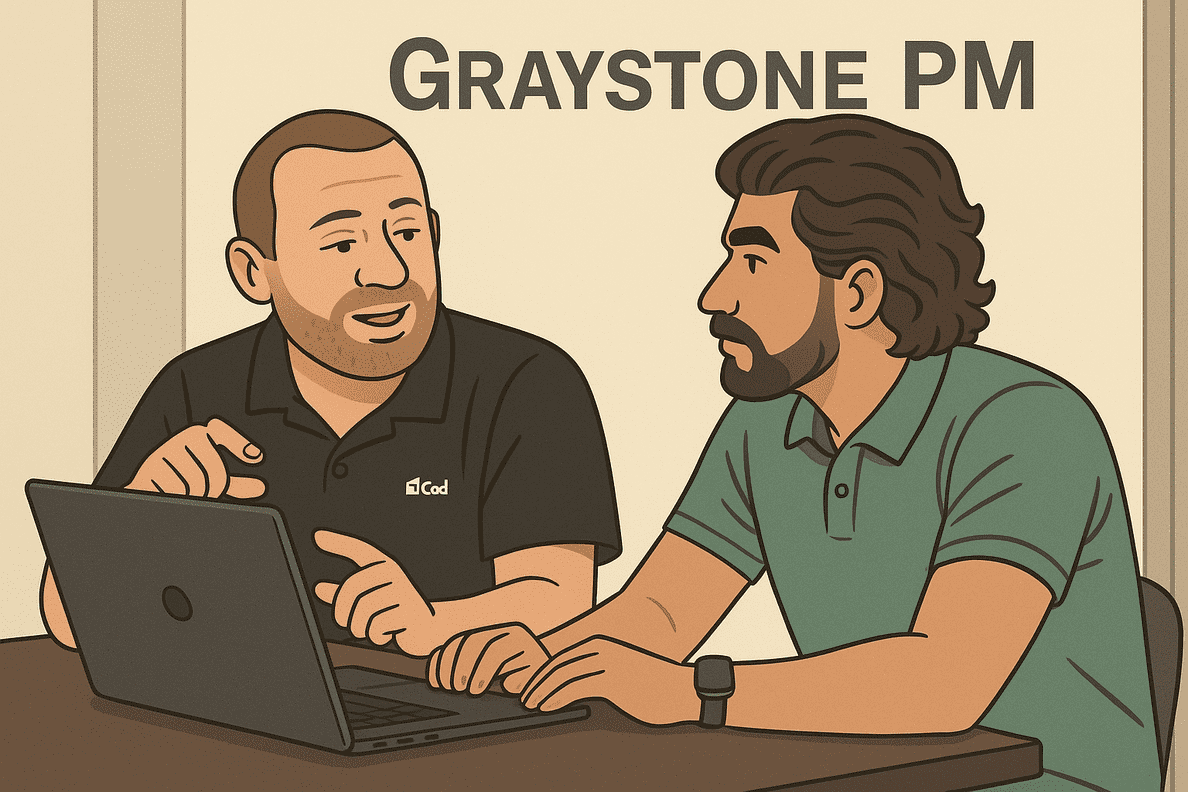
“Everything’s Fine… Until It’s Not”: What Self-Managing Landlords Don’t See Coming
By Jay Michalec, COO of Graystone Property Management
The landlord I sat down with last week was feeling pretty bullish.
He was managing a few properties himself, collecting rent, staying full, and saving money by skipping a property manager. To him, things were smooth. He had his system—texts to tenants, an old lease he found online, and a handyman he calls when things break. It was working… or at least, it looked like it was.
But the longer we talked, and the more I asked questions, the more cracks started to show.
“Wait… you’re supposed to deliver that notice in person?”
“I didn’t know I couldn’t keep the deposit in my business account.”
“I usually just go with my gut on tenants. That’s been fine… so far.”
That conversation hit me. This guy wasn’t lazy or reckless—he’s just like a lot of self-managing landlords I meet. He thinks everything’s fine, until he finds out it’s not. And by then? It’s already costing him money, time, or legal headaches.
So here’s what I walked him through—the real costs of self-managing rentals that don’t show up in the beginning but have a habit of showing up fast when things go sideways.
1. Gut-Based Tenant Screening Will Burn You
Most self-managing landlords rely on first impressions, a pay stub, maybe a quick phone call. But one bad tenant—just one—can undo years of good investing. Evictions, damages, unpaid rent… I’ve seen it all. And it usually starts with skipping proper screening.
What happens: A “nice” tenant turns into a financial disaster.
What went wrong: No full credit, background, or income checks.
What it costs: Legal fees, vacancy, repairs, and lost sleep.
2. Your Lease Isn’t Worth Much If It’s Not State-Specific
Using a lease you found online or borrowed from a friend? Hope you never need to enforce it. I’ve seen leases tossed out in court because they didn’t match state law—or worse, violated it.
What happens: Lease dispute goes to court, and you lose.
What went wrong: Outdated or generic lease language.
What it costs: Legal battles, lost rent, fines, or being forced to refund money.
3. Improper Notice = Eviction Case Dismissed
One of the biggest mistakes I see is landlords who send a text or email when a tenant misses rent, thinking that counts as official notice. It doesn’t. Not by the book. And judges don’t play around with this stuff.
What happens: Eviction gets thrown out, tenant stays longer.
What went wrong: Notice not delivered properly or legally.
What it costs: Starting over, legal fees, and more unpaid rent.
4. Security Deposit Mistakes = Triple Damages
This one sneaks up on a lot of landlords. Holding deposits in personal accounts. Deducting for vague “cleaning” charges. Missing deadlines to return it. In many states, that’s enough to get sued—and lose big.
What happens: Tenant sues and wins.
What went wrong: Violated deposit handling laws.
What it costs: Triple damages, court costs, and your reputation.
5. Small Repairs Turn Into Big Emergencies
You ignore that little drip, the small AC rattle, or the cracked tile—then one day it becomes mold, a blown HVAC unit, or a slip-and-fall lawsuit. Deferred maintenance might save you today, but it’ll cost you tomorrow.
What happens: You’re hit with a massive repair—or a code violation.
What went wrong: Ignored the issue too long.
What it costs: Emergency calls, tenant frustration, possible lawsuits.
6. Overpricing Leads to Long Vacancies
You love your property. You want top dollar. So you list it high, thinking someone will bite. They don’t. A month passes, then another. Now you’re desperate and taking whoever shows up.
What happens: Your best tenants moved on. You get stuck.
What went wrong: Emotional pricing instead of market strategy.
What it costs: Lost rent, weak tenants, and wasted time.
7. No Documentation = No Leverage
You didn’t do a proper move-in inspection. You didn’t take photos. Now the tenant’s moved out, and the unit’s trashed—but it’s your word against theirs.
What happens: You lose your claim and return the full deposit.
What went wrong: No documented proof of property condition.
What it costs: Repairs on your dime and a dent in your bottom line.
8. Too Friendly = No Boundaries
You gave them your personal number. You let rent slide “just this once.” You didn’t enforce the lease terms because you didn’t want conflict. But what you allow becomes the norm—and now they expect favors.
What happens: Rent is late, rules are broken, and you have no control.
What went wrong: You blurred the line between landlord and buddy.
What it costs: Late payments, stress, and zero leverage.
9. DIY Evictions Are a Legal Minefield
Evictions are technical. One wrong form, one missing step, and the whole thing gets tossed. I’ve watched landlords lose months of rent because they tried to DIY the process based on a blog post or YouTube video.
What happens: You’re back to square one.
What went wrong: Improper filings, notices, or legal grounds.
What it costs: Time, money, and a tenant still living rent-free.
The Illusion of Control
The biggest trap in all of this? Feeling like you’re in control just because nothing bad has happened yet. But this stuff doesn’t show up right away. It simmers. It builds. Then it explodes at the worst time possible—and by then, it’s too late to fix it cheaply.
If you’re self-managing one or two properties and everything’s going well, I’m happy for you. But ask yourself this: is your system actually working… or have you just been lucky?
Final Thought: You Don’t Know What You Don’t Know
What got you here—your hustle, your instincts, your willingness to do it yourself—might not be enough to keep you out of trouble long-term. As your portfolio grows, or as the laws shift, or as that one nightmare tenant moves in… you need more than hustle. You need structure. Systems. Compliance. Support.
That’s what separates successful investors from accidental landlords.
So yeah, the landlord I met with last week started the conversation feeling bullish. But by the end, he was ready to rethink his approach. And that’s what made me write this. If even one of these issues hits home, take a step back and ask yourself: Are you managing your rentals like a business—or just hoping nothing goes wrong?
This is Jay Michalec, COO of Graystone Property Management. I’ve seen it all. If you ever want to talk strategy or avoid the common pitfalls, we’re here for you.
Pick your expert. Book your free 15-minute consult now. We are here to help!
Our Top Articles
How Does a Property Flipper Make a Profit in 2025?
Jorge Vazquez2025-07-11T20:16:48+00:00July 11th, 2025|Comments Off on How Does a Property Flipper Make a Profit in 2025?
How Does a Property Flipper Make a Profit in 2025? By Jorge Vazquez, CEO of Graystone Investment Group It's [...]
The College Rental That Nearly Schooled the Landlord: Lessons from Bradley’s Student Housing Fiasco
Jorge Vazquez2025-07-10T19:32:35+00:00July 10th, 2025|Comments Off on The College Rental That Nearly Schooled the Landlord: Lessons from Bradley’s Student Housing Fiasco
A "Safe Bet" Gone Sideways Bradley is one of those agent-investors we all admire. Sharp, experienced, hands-on, [...]
Opportunistic Buyers Are Back: Why Florida’s Real Estate Market Feels Like 2010 Again
Jorge Vazquez2025-07-09T01:10:13+00:00July 8th, 2025|Comments Off on Opportunistic Buyers Are Back: Why Florida’s Real Estate Market Feels Like 2010 Again
If you were around during the aftermath of the 2008 crash, you might remember that eerie silence around 2010—the [...]
Property Profit Academy:
✔ Learn to buy properties with little to no money down.
✔ Build a $10M portfolio step by step.
✔ Master strategies like BRRRR and house hacking.









